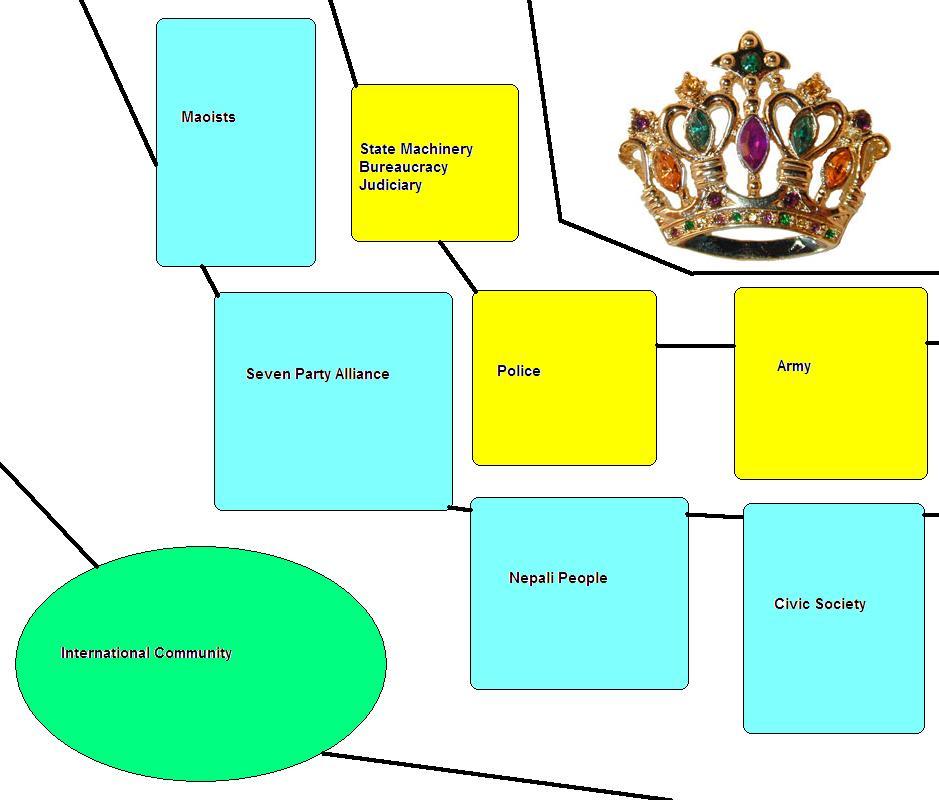
The Maoists announced a three month long ceasefire, and then extended it by a month. That extension expires in a few short days. They have said they will not extend it this time around. What is in store? What could happen?
I sincerely hope they do not go back to their old ways. I hope they are not planning some kind of a large scale, surprise attack on one of the RNA installations. Because if they do that, we will be back to square one. All political progress made since the ceasefire announcement could go down the drain. The Maoist-Democrat alliance will come under a tremendous strain. The international community will want the seven party alliance to choose between them and the Maoists, and the Maoists are not going to be a choice. The regime will claim victory. They will happily go back to war. The bipolarization in the making will evaporate off.
Why would the Maoists want that?
The best option would have been if the king had reciprocated to their ceasefire. But the king did not. That shows the king is not at all interested in the idea of a constituent assembly. I don't agree with him on that one, but I can see why. A constituent assembly could turn the country into a republic. Even if the monarchy is retained, it will be truly a ceremonial one. Why would this self-professed activist king want any of those two options? Put yourself in his shoes.
Instead if the Maoists were to reciprocate the king's unreasonableness, they would be doing the king a huge favor. It would be unreasonable to go to war.
So I say to Prachanda and Baburam, don't do it. Don't go back to war. Instead do this: Isolating The Monarchy.
What options do the Maoists have?
One obvious option is to extend the ceasefire. They have done it for seven months in a row in the past. They could add a few more to these four months. They still get to keep their armed cadres in an "active defense" mode.
Another would be to let the ceasefire expire, but still keep the armed cadres in an "active defense" mode. Technically the ceasefire is over, but in practical terms not much has changed.
But the best moves the Maoists could make are not military at all.
The Maoists have increased their army size from three to seven battalions after the ceasefire announcement. Does this prove the royalists were right along, that the only reason the Maoists declared the ceasefire was to give themselves a breather? No. I think they waited for a week and then realized they might have to engage in yet another round of combat, so they prepared.
Prachanda has said this regime will fall before the Nepali new year. He is the first person in the Maoist-Democrat alliance to have come up with a deadline. I like that.
The Maoists have also warned the regime that if they were to engage in a military crackdown on the peaceful demonstrators in the capital, their army will march into the valley from both east and west, kind of like Fidel Castro marching into Havana. This is not unlike the diaspora warning the regime of global legal action should there be a military crackdown. (Project Nepal Democracy)
The Maoists have also announced programs of peaceful mobilization of the people. (Maoists Should Go Beyond Ceasefire To Peaceful Mobilization)
My recommendations to the Maoists are based on what they themselves have said.
- Do not go back to violence.
- Engage in a major propaganda war with your threat against any possible military crackdown. That will encourage the people to come out into the streets.
- Engage in peaceful mobilizations of your cadres and the people as much as you can.
- Launch a propaganda offensive against the RNA foot soldiers. Lenin did that to great effect. Infiltrate the army ranks with your propaganda. Let them see the current regime is not in their interests. This is much stealth work, not unlike planning a major military campaign. Channel your martial urges into this.
- Isolate the king. Build on the work done so far. My proposal is in the diagram above.
- Do not make any attempts to kill those who might decide to contest the February 8 polls. Instead visit as many homes as possible to urge people to stay back home on that day. If you kill candidates, you invite a fissure between yourself and the seven party alliance due to the global power arithmetic. The acts will be too spectacular to get ignored.
- A day or week long nationwide strike to disrupt the February 8 polls is okay. Whatever floats your boat.
- Revise your 12 point agreement. The seven parties should drop the House revival idea. The Maoists should agree to integrate the two armies before the constituent assembly elections as long as the interim prime minister is the Commander In Chief of the army. (10 Point Agreement To Succeed 12 Point Agreement)
OHCHR receives assurance from Maoist leadership NepalNews
NHRC probe team visits Nagarkot
Four judges appointed at Supreme Court
RPP in Crisis
Their Majesties to visit eastern region from January 1
UML General Secy seeks UN intervention for peace
Nepal yet to pay over USD 26 mn to India for military supplies Outlook (subscription), India
Nepal army starts 'biggest' Maoist hunt
3 killed in Rolpa clash
UN intervention necessary in Nepal: Leaders Webindia123, India
Seven parties set to disrupt municipal polls Kathmandu Post, Nepal
NHRC to meet king to talk ceasefire Kathmandu Post, Nepal
Govt considering parties’ proposal Kathmandu Post, Nepal
Political leaders dare govt on Thapa's threats Kathmandu Post, Nepal
